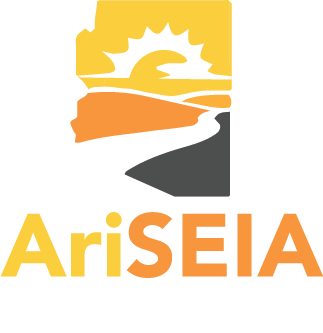|
THE SOLAR COALITION’S EXCEPTIONS AND PROPOSED AMENDMENT TO STAFF’S MEMORANDUM AND PROPOSED ORDER
DOCKET NO. E-00000A-22-0103 The signatories listed below appreciate the opportunity to continue their close involvement in the development of Arizona's community solar program and offer these Exceptions and Proposed Amendment to support the Commission as it decides how to move forward in the Arizona Public Service (APS) territory. This docket presents the Commission with an opportunity to provide savings to electric utility customers, promote electric grid resiliency, and assist Arizona in its transition to clean energy. The signatories have been committed to participating in the working group discussions and docketing information to assist in the Commission’s consideration of a proposal for implementation of a community solar program, as envisioned in Commission Decision 78583 (May 27, 2022). The signatories have come together and presented a comprehensive community solar proposal to the Commission on August 26th based on vast experience in community solar programs around the country. The signatories represent a diverse range of interests and the program proposal submitted encompasses a consensus agreement among all fourteen (14) parties represented at the time of filing, was responsive to the directives in Commission Decision 78583 and to the questions raised during working group meetings, was based on sound compromise, and was tailored to Arizona’s regulatory environment. Unfortunately, Staff’s Memorandum and Proposed Order does not meet the requirements contained in Commission Decision 78583. After six (6) months of robust discussions and dozens of filings in this proceeding, Staff has not provided any substantive policy recommendations on the programmatic elements specified in Commission Decision 78583. Instead, Staff suggests that a substantial portion of the program details be moved to an evidentiary hearing process, which could lead to some elements being significantly delayed. This is not what the Commission directed. Six (6) months ago, the Commission discussed the process of developing a community solar program in detail and decided that this docket and the working group format was the appropriate pathway to create a program proposal on which to vote. The Commission directed Staff to put forth a proposal for implementation in advance of the November 2022 Open Meeting and further specified that the proposal should become effective within six (6) months of Commission approval. An evidentiary hearing would only serve to delay the implementation of a community solar program and needlessly increase the investment of time and resources from participants, Staff, and the Commission. Moreover, because a hearing process would trigger the Commission’s ex parte rules, such a proceeding would limit the Commission’s ability to discuss key program elements with the diverse range of stakeholders, which has been a key benefit throughout the working group process. An evidentiary hearing is simply not required to construct a workable community solar program. Additionally, Staff’s Memorandum and Proposed Order references only Arizona Public Service’s (APS) program proposal. As discussed in the signatories’ response to the APS proposal filed on October 7, 2022, the APS proposal will not result in competitive third-party development of community solar projects and, as such, restricts benefits that would be created for APS customers and should be disregarded. As detailed in The Potential Economic and Fiscal Impacts of Community Solar in Arizona report prepared by the Seidman Research Institute at Arizona State University, the benefits of community solar investment extend beyond subscribers to the program, to the entirety of the state. The rollout of three hundred (300) MW of community solar each year for ten (10) years (study Scenario #6) would contribute over five (5) billion dollars to state Gross Domestic Product (GDP), result in the creation of more than fifty-eight (58) thousand job years of total employment, and nearly four (4) billion dollars in labor income over a study period of thirty-five (35) years. Commission approval of the APS program proposal, as written, would deny these benefits to Arizonans across the state. Simply put, APS’s proposal is not community solar. The signatories have dedicated significant time and resources to help develop a program proposal pursuant to Commission Decision 78583 that includes program design elements based on successful community solar programs across the country and is responsive to feedback raised by parties participating in the working group. However, Staff’s Memorandum and Proposed Order does not reference the signatories proposal, despite the comprehensive and robust information that the signatories have continued to submit in this proceeding. The lack of discussion or consideration of any components of the signatories’ proposal is notable given that only two program proposals have been made in this proceeding – one by APS and one by over a dozen diverse signatories. Herein, the signatories offer Exceptions and a Proposed Amendment to the Staff’s Memorandum and Proposed Order. See Attachment A for the Proposed Amendment. The signatories offer the Proposed Amendment in an effort to assist the Commission in devising a community solar program that is consistent with the intent of Decision 78583 and the months-long discussions in the community solar stakeholder workshops. The participants to those proceedings spent considerable time and resources in those workshops, including the utilities and Commission Staff, and should not be made to duplicate the effort in an entirely new proceeding. The signatories thus urge the Commission to reject Staff’s proposal and adopt the Proposed Amendment, which balances the key program requirements that must be included for successful implementation and operation of the program.
0 Comments
Leave a Reply. |
AriSEIA NewsKeep up with the latest solar energy news! Archives
July 2024
Categories
All
|
NEWS
See what AriSEIA is up to on the policy front.
The Arizona Solar Energy Industries Association (AriSEIA) is a 501(c)(6) non-profit trade association representing the solar, storage, and electrification industry, solar-friendly businesses, and others interested in advancing complementary technologies in Arizona. The group's focus is on education, professionalism and promotion of public policies that support deployment of solar, storage, and electrification technologies and renewable energy job growth and creation. |
FOLLOW Us |
Copyright © 2019 AriSEIA - All Rights Reserved

 RSS Feed
RSS Feed
